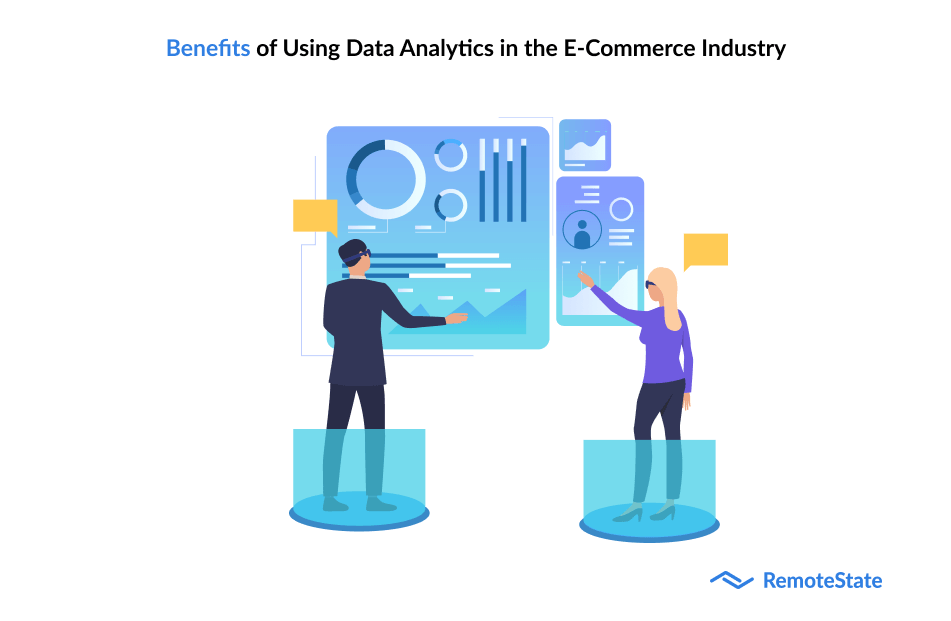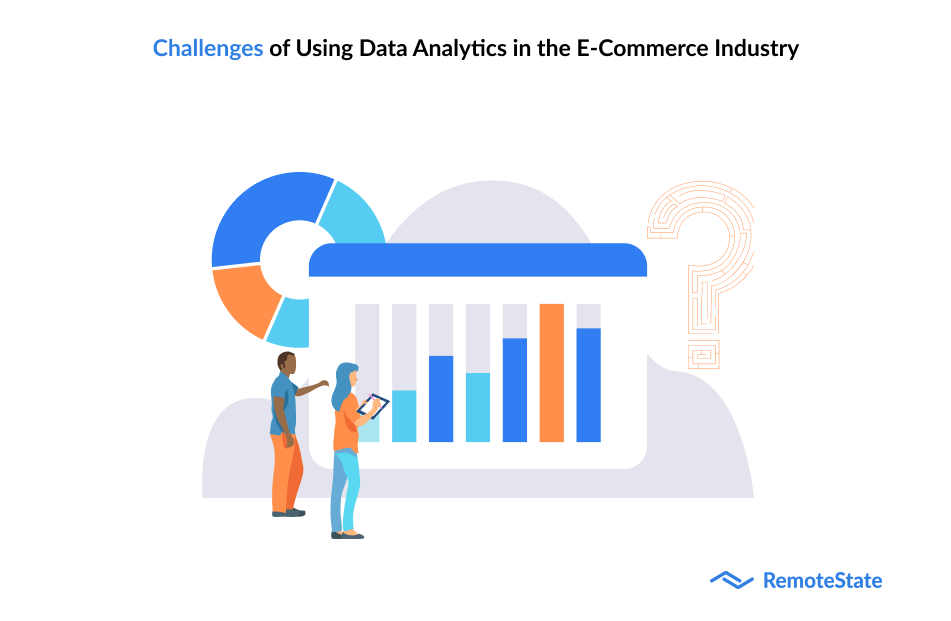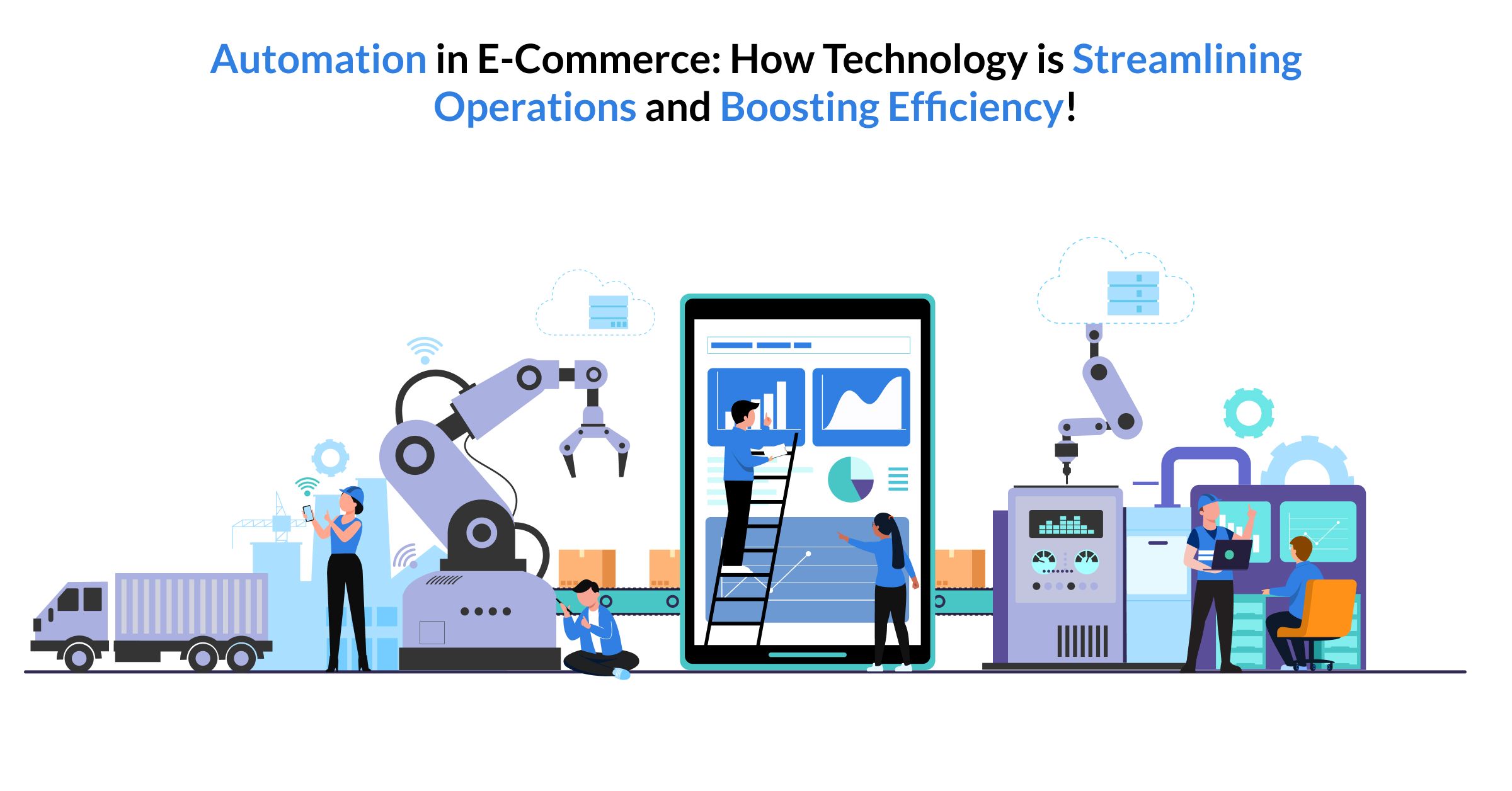Introduction
Data analytics has transformed the way e-commerce businesses operate. It has enabled them to make better choices based on customer behavior, preferences, and market trends. With the rise of big data, e-commerce businesses have access to vast amounts of data that can be used to improve sales, customer engagement, and marketing efforts.
Data analytics has transformed the way e-commerce businesses operate. It has enabled them to make better choices based on customer behavior, preferences, and market trends. With the rise of big data, e-commerce businesses have access to vast amounts of data that can be used to improve sales, customer engagement, and marketing efforts.
In this blog, we will explore how data analytics is aiding e-commerce businesses in making better choices, and the benefits, challenges, and opportunities of using data analytics.
Benefits of Using Data Analytics in the E-Commerce Industry

Improved Customer Experience
Data analytics provides e-commerce businesses with valuable insights into customer behavior, preferences, and needs. By analyzing this data, businesses can personalize their marketing efforts, recommend products, and tailor their customer experience. For example, if a customer has a history of buying a particular product, an e-commerce business can recommend similar products or offer personalized discounts, improving the customer experience and increasing customer loyalty.
Better Inventory Management
One of the biggest challenges for e-commerce businesses is managing their inventory effectively. Data analytics can help businesses optimize their inventory by providing insights into product demand and inventory levels. By using predictive analytics, businesses can forecast demand and adjust their inventory levels accordingly. This helps businesses avoid stockouts and overstocking, which can result in lost sales and excess inventory costs.
Increased Sales and Revenue
Data analytics can help e-commerce businesses identify new revenue streams and opportunities. By analyzing customer behavior and purchase patterns, businesses can identify potential cross-selling and upselling opportunities. For example, if a customer buys a camera, an e-commerce business can recommend additional products like camera lenses, tripods, and camera bags. This can lead to increased sales and revenue.
Better Marketing Campaigns
Data analytics can help e-commerce businesses optimize their marketing campaigns. By analyzing customer behavior, businesses can identify which marketing channels are most effective, which products are most popular, and which promotions are driving the most sales. This helps businesses tailor their marketing efforts to the most effective channels, products, and promotions, improving their return on investment (ROI) and maximizing their marketing budget.
Challenges of Using Data Analytics in the E-Commerce Industry

Data Quality
The quality of data is a critical factor in the effectiveness of data analytics. E-commerce businesses may struggle with data quality due to issues like data fragmentation, inconsistencies, and data silos. To overcome this challenge, businesses need to invest in data management tools and processes that ensure data accuracy and consistency.
Data Security
Data security is a significant concern for e-commerce businesses. With the rise of cyberattacks and data breaches, businesses need to ensure that their data is secure and protected. This can be challenging for businesses that handle sensitive customer information like credit card details, email addresses, and phone numbers. To overcome this challenge, businesses need to implement robust security measures like encryption, two-factor authentication, and regular data backups.
Skill Gap
Another challenge for e-commerce businesses is the skill gap in data analytics. Many businesses lack the skills and expertise needed to effectively use data analytics tools and technologies. To overcome this challenge, businesses need to invest in training programs and hire data analytics professionals who can help them make sense of their data.
Opportunities of Using Data Analytics in the E-Commerce Industry
Improved Customer Insights
Data analytics can provide e-commerce businesses with valuable insights into customer behavior, preferences, and needs. By analyzing this data, businesses can personalize their marketing efforts, recommend products, and tailor their customer experience. This helps businesses improve customer satisfaction, loyalty, and retention.
Cost Savings
Data analytics can help e-commerce businesses identify cost-saving opportunities. By analyzing inventory data, businesses can optimize their inventory levels, reducing excess inventory costs. By analyzing marketing data, businesses can identify the most effective marketing channels and promotions, reducing their marketing spend. By identifying cost-saving opportunities, e-commerce businesses can improve their profitability and competitiveness.
Competitive Advantage
Data analytics can provide e-commerce businesses with a competitive advantage. By analyzing market trends and customer behavior, businesses can identify new opportunities and stay ahead of their competitors. For example, by analyzing search trends, businesses can identify emerging product categories and enter new markets before their competitors.
Improved Operational Efficiency
Data analytics can help e-commerce businesses improve their operational efficiency. By analyzing supply chain data, businesses can optimize their logistics and reduce shipping times. By analyzing customer data, businesses can identify customer service issues and address them proactively, reducing the number of customer complaints and returns. By improving operational efficiency, e-commerce businesses can reduce costs and improve customer satisfaction.
Conclusion
Data analytics is transforming the way e-commerce businesses operate. By providing valuable insights into customer behavior, preferences, and needs, data analytics is helping businesses improve the customer experience, increase sales and revenue, and optimize their operations.
However, using data analytics in e-commerce comes with its own set of challenges, including data quality, data security, and skill gaps. By addressing these challenges and leveraging the opportunities of data analytics, e-commerce businesses can gain a competitive advantage and improve their profitability and customer satisfaction.
Unlocking the Power of Data Analytics: How Remotestate Can Help E-Commerce Businesses Make Better Decisions!
Remotestate can help e-commerce businesses leverage data analytics to improve their operations and gain a competitive advantage. Here are some ways Remotestate can help:
Customized Data Analytics Solutions
Remotestate can provide e-commerce businesses with customized data analytics solutions that are tailored to their unique needs and goals. Whether a business wants to optimize its inventory management, improve its marketing campaigns, or enhance the customer experience, Remotestate can develop a data analytics solution that meets its specific requirements.
Data Management and Integration
Data quality is crucial for effective data analytics. Remotestate can help e-commerce businesses ensure the accuracy and completeness of their data by implementing data management tools and processes. Additionally, Remotestate can integrate data from multiple sources, such as customer data, sales data, and marketing data, to provide a more comprehensive view of the business.
Security Measures
Data security is a critical concern for e-commerce businesses. Remotestate can help businesses implement robust security measures to protect their data from cyber threats and data breaches. This includes implementing encryption protocols, firewalls, and other security measures to safeguard sensitive data.
Training and Support
Data analytics requires a certain level of expertise and skill. Remotestate can provide training and support to e-commerce businesses, including training employees on how to use data analytics tools and software and providing ongoing technical support to ensure that the data analytics solution is working effectively.
In summary, Remotestate can help e-commerce businesses leverage data analytics to improve their operations and gain a competitive advantage. By providing customized solutions, data management and integration, security measures, and training and support, Remotestate can help businesses unlock the full potential of data analytics.
FAQs
What is data analytics, and how is it used in e-commerce?
Data analytics involves the process of collecting, processing and analyzing data to gain insights and make better decisions. In e-commerce, data analytics is used to understand customer behavior, preferences, and needs, optimize inventory levels, improve marketing campaigns, and enhance the customer experience.
What are the benefits of using data analytics in e-commerce?
The benefits of using data analytics in e-commerce include improved customer experience, better inventory management, increased sales and revenue, and better marketing campaigns.
What are the challenges of using data analytics in e-commerce?
The challenges of using data analytics in e-commerce include data quality, data security, and skill gaps.
How can e-commerce businesses overcome the challenges of using data analytics?
E-commerce businesses can overcome the challenges of using data analytics by investing in data management tools and processes, implementing robust security measures, investing in training programs, and hiring data analytics professionals.
What are the opportunities for using data analytics in e-commerce?
The opportunities for using data analytics in e-commerce include improved customer insights, cost savings, competitive advantage, and improved operational efficiency.
Publication Date
2023-04-21
Category
E-Commerce
Author Name
Rahul Agrawal


